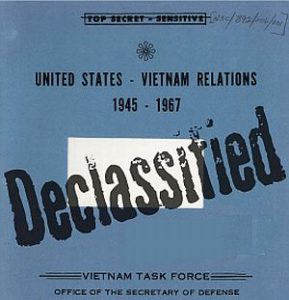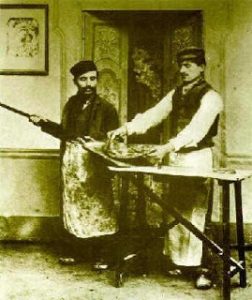Myths
The Pentagon Papers
The Pentagon Papers Professor Phil Nash helps us explain the complicated and much-mythologized history of the Pentagon Papers, which is shorthand for the government-funded study of US involvement in Vietnam from 1945 to 1967. According to New York Times in 1996, the Pentagon Papers showed that the government had, “systematically lied, not only to the…
Read MoreMan Crush Monday! Varian Fry
You’ll often hear the phrase that there’s “a special place in hell (or a special circle of hell, or special level of hell) reserved for…” which then proceeds on to a quip about a relatively minor social infraction (“those who waste good whiskey,” “those who split infinitives”). Obviously, it’s also used to refer to the…
Read MoreThe Pizza Effect
Yes, it’s me, your favorite professor, here to get you back on the straight and narrow. Today I’m going to talk about something called “the pizza effect,” but it’s not the effect that pizza has on our collective waistlines. The pizza effect is something that affects our thinking about the history and origins of foods,…
Read MoreVietnam: War and History
Professor Phil Nash explains the history of Vietnam in the 20th century, and the very complicated ways in which it was torn apart by war and civil war throughout the mid-century. Along the way, we learn about the deep complications in the history of the Vietnam War that have allowed myths and misconceptions to solidify.…
Read MoreGreat October Revolution – 100th Anniversary
The Russian Revolution of 1917 was one of the most important events in the 20th century. Professor Nash joins us to untangle the extremely complicated history of Russian politics between 1905 and 1917. He tells us what happened and why. Why, for instance, were there so many revolutions (or “state coups”) between the Russo-Japanese War…
Read MoreProgrammed Inequality: Women and British Computing
Professor Marie Hicks joins us to talk about gender and employment in the emerging field of computing in Britain, and all the historical myths that surround them. In 1944, Britain led the world in electronic computing. By 1974, the British computer industry was all but extinct. We examine why this happened in the tense post-war…
Read MoreThe Irish Slaves Myth
Ah, Buzzkillers, all of you know the depth of my love/hate relationship with the internet. On the one hand, I love the internet and the crazy history stories that fly around it via email and blog posts. They provide grist for the Buzzkill Institute mill, and, of course, keep us floated financially, as well as…
Read MoreCause of the Civil War
Cause. Singular. Not plural. We talk about the cause of the American Civil War because there was one overwhelming cause — slavery. Not tariff disputes. Not states’ rights. The Civil War was fought over the preservation of slavery in the south and its expansion to the west. But, perhaps no other aspect of the history…
Read MoreConfederate Statues, Memorials, and Flags
When and why were statues to Confederate soldiers, generals, and politicians put up across the American south? Why is the Confederate Battle Flag so proudly waved and displayed in many parts of the US? Professor Nash joins us to explain why all of this happened, who was selected for commemoration, and what it all means…
Read MoreThe KKK: History and Myths
No one actually cares why I started this show, Buzzkillers. But I did so because I worried about the strength with which cultures seem to hold on to historical myths. That strength seemed to be one of the things that affected our thinking and, sometimes, the way we acted, and perhaps even the way we…
Read More









